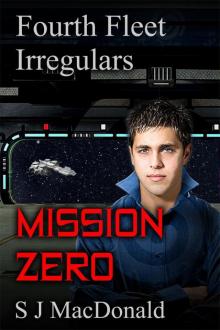- Home
- S J MacDonald
Karadon (Fourth Fleet Irregulars) Page 7
Karadon (Fourth Fleet Irregulars) Read online
Page 7
Director Torres ran the same summarising software on a twenty minute interview with Annabella Tokford’s parents, dated just six months ago. The bullet points that came up for that were:-
Alex came to Anna’s funeral.
He came to see us afterwards.
He was just the kind of lad we’d have liked to see our Anna going out with, if things had been different.
When he came to see us again and asked if he could tell Anna’s story, to try to stop other kids ending up the way she did, we told him that he had our blessing.
It was genuine. The inquest records had been aboard Karadon for years. Alex von Strada really had found a dead teenager, and he was now using that, ruthlessly, to justify his aggressive attitude towards the station.
“Very good,” Director Torres commented, with an air of dispassionate admiration.
“Good?” Chok echoed incredulously, and then remembered who he was talking to and hastily modified his tone. “I don’t understand, Director.”
“The Admiralty put him on a media relations course, after that fiasco at Chartsey,” Director Torres explained, which was not something she did very often. “He learns fast, evidently.” She looked at him with a slightly weary expression, seeing his lack of understanding. “Everything he’s done, from the timing of his arrival to the timing of that statement, has been geared to maximise reaction. That story will be on air here within minutes, and hitting news screens across the League as fast as couriers can carry it.”
“But it’s outrageous!” Chok protested. “It’s just blatant emotional grandstanding! He can’t just make a statement claiming that eighty tons of DPC has come through the station!”
“Eighty six,” the Director corrected. “And he did not seem to me to be plucking that figure out of the air.”
It took a few seconds for the implications of that to sink in.
“You can’t mean that you think there could be any foundation to that?” Chok said, appalled.
“I think,” said Director Torres, “that you are failing to take into account the true nature of the Fourth’s advantage, here. Von Strada is not an ordinary Fleet skipper. He reports directly to the First Lord and is here at the personal request of the League President. Every other involved agency has been told to give him their full cooperation, including all the information they have about what’s happening aboard this station. He has the active support of the Second Irregulars in equipping his ship with the very latest technology, and strong ties with Fleet Intelligence, too. The LIA and Customs Intel are giving him their full support. Even the League Prisons Authority has got on-side, assisting with provision for prisoners aboard his ship. Understand, Mr Dayfield. The League has united all their effort in a massive combined operation focussed to a laser point, and that point is Skipper von Strada. Do not underestimate him, or dismiss what he says. Whether it’s true or not, every statement he makes is strategic, and should be considered as such.”
“Oh.” The words you are failing had sent a chill through him, and Chok looked apologetic, then. He felt like protesting that he was a resort manager, that he shouldn’t be expected to have to deal with things like intelligence agencies. What he actually said, though, was, “I see.” Then, after a moment to pluck up his courage, “I don’t understand how he can make such a claim, though.”
Director Torres looked at him with the same kind of interest she might show in a peculiar zoological exhibit. She could see nothing but heartfelt sincerity in him, a rock solid belief that it was utterly impossible for his beloved station to be involved in drug trafficking.
ISiS Corps valued that. It was important to them to have a man of high integrity in charge at the station.
“Well, you can demand to see his evidence in support of that claim,” Director Torres observed, “but I’ll be surprised if he answers you. His next move will be directed at the freighters.”
Chok looked at her, feeling so totally out of his depth that he didn’t have a clue what was going on.
“I think I’d better call a board meeting,” he said. Just for a moment, he thought he saw something like a look of cool amusement on the Director’s face, but as she merely nodded, he thought he must have imagined it.
Chapter Six
“Lt Commander … Chief.” Alex shook hands with Tom and then with Murg, gesturing hospitably for them to join him at the command table. “Do sit down.”
They did so, both of them uneasily aware that they were on camera throughout the ship.
They were both looking, and feeling, much better, though. Rangi’s medical had found that they were both stressed and run down, but not to a level where he’d have had to take them off duty. After both had declined offers of either conventional treatment or alternative therapies, they’d been taken to their quarters and provided with kit.
Tom was feeling rather absurdly proud of his uniform. The Fourth wore a grey version of the Fleet’s shipboard rig, but the ones they’d provided for him were real Fleet blues. They were the right size, too, and had Lt Commander’s insignia.
It was the first time he had actually worn that. He and Murg had both been promoted as part of being recruited for Admiral Smith’s special operations unit, but that had been off the books, of course. It felt really good to be back in uniform, and to be displaying his true rank.
Murg, if anything, was even happier. She’d been looked after by the ship’s Master at Arms, the CPO Burdon who’d arrested them aboard the Fancy Free. She had turned out to be a surprisingly young woman for the rank she held as the most senior petty officer aboard the ship. They would not have been nearly as intimidated by her if they’d been able to see her attractive, heart-shaped face, soft brown eyes and scattering of freckles. She had introduced herself as Hali and told Murg that she would be her “oppo”. That was one of the more humane Fleet traditions, with someone of similar rank appointed to be oppo or official friend to newcomers aboard ship, responsible for taking care of them and helping to settle them in.
For Murg, it had been like coming home to family. She too was loving being back in uniform, displaying her CPO insignia for the first time. Both of them had also enjoyed a very good breakfast. There hadn’t been champagne, but the Ruby Splendour had done the frigate proud, sending over a first-class buffet spread that would have fed a carrier’s crew. Both Tom and Murg had felt a little shy, at first, at joining in with the bean feast. It was, after all, a gift from the skipper to his crew, and neither of them felt that they were entitled to that. They had not needed much persuading, though, and had enjoyed the best meal they’d had for a very long time.
Murg had also joined in the ship-wide groan when it was confirmed that there were no financial records on Karadon’s system. A new category had had to be added to the score sheet, that of “DU” for “Data Unobtainable.” Four points had gone to that, so far. There’d been huge cheering, though, as the Juvenile Delinquents had slammed in with another hit, cracking the encryption on a data-cache containing personal records and correspondence.
Then the ship had got very quiet as the skipper made that call. Tom had been appalled by that on so many levels he didn’t know where to start. The horror of the girl’s death and Alex von Strada’s experience in finding her was awful, in itself. The fact that she was only one of hundreds of thousands of DPC addicts who died every year, across the League, was even more horrific.
For Tom, though, the way in which Alex von Strada had pitched that out to the media had been almost as shocking. Fleet skippers were not supposed to make dramatic statements like that, either to their crew or to the public. The Fleet was supposed to function on calm, impersonal authority, the smooth and orderly workings of an inviolate chain of command. If things started getting emotive and personal, they could very soon get out of control. Tom would not voice such views about his new commanding officer, though. He could only trust that Alex had approval from higher up for such deplorable unprofessionalism.
“I hope that you’ve been well looked after
,” Alex said, with an appraising look at them.
“Very well, thank you, sir,” Tom said, and Murg murmured agreement.
“Good.” This evidently exhausted the skipper’s repertoire of sociable small talk, as he gave a brief smile and got straight down to business. “All right, then. Debriefing.”
Tom started to get up and then realised that the skipper hadn’t moved.
“Here, sir?” He asked, with a glance around at the command deck.
“Here,” Alex confirmed, and as Tom sat down again, trying not to show his dismay, “All my crew have clearance, and my full confidence. So…”
He handed Tom a high security micro-disc of the kind used by the Fleet for classified mail, and gestured invitingly to a reader-slot on the table.
Tom accessed the disc and found that it contained just one document. It was written in the usual archaic style the Fleet used for mission orders, beginning with the grand “Pursuant to the Devices of the Constitution of the League of Worlds” and ending “Given this day”, with a date five months previously, and “By the hand of Dixon Gerard Arakin Harangay, First Lord of the Admiralty.”
Essentially, all it actually said was that Tom and Murg were to be under Alex von Strada’s orders until further notice. Below the First Lord’s flourishing signature was an even more familiar handwriting. A tightly controlled hand had added a PS, “Give full cooperation. Adml. Smith.”
That was good enough for Tom. It was good enough for Murg, too, reading it beside him.
“Sir.” They acknowledged the skipper, their skipper now, with an air of being ready for whatever might be asked of them. Alex nodded back, satisfied.
“So,” he said, with a gleam of amusement, “I daresay you’re wondering how we’ve managed to crack Karadon’s systems.”
“Yes sir!” Tom and Murg said, simultaneously, with such feeling that many of those on the command deck laughed.
“Radio Karadon,” Alex informed them, and smiled again at their incomprehending looks. “You know Karadon has their own in-house holochannel, yes?”
“Yes sir,” said Tom, looking at him attentively.
“And alongside that, they run an audio-only broadcast, for people who prefer that,” Alex told him. “Which gets broadcast out to ships in orbit, too.”
“Yes sir,” said Tom, still puzzled.
“Channels want ratings.” Alex said. “Even cacky little stations out in the middle of deep space want to know how many people are watching or listening to them. So they include, routinely, a radar signal in the broadcast which is activated when the station is turned on, whether that’s in hotel rooms, personal comms or aboard ship. That means that there’s a continuous, open two-way comms link. That’s how our hackers got in, and that’s how they’re uploading Karadon’s files. We’ve cloned their backup system so that it backs up files to our computers too, via the Radio Karadon feed. It only gives us a thin datastream so it’ll be a few hours before we have everything, but we’re searching for files of particular interest first, of course. Unless they twig to it and discontinue all broadcasts, we’ll continue to get backup copies of everything they do.”
“Oh, that is brilliant!” Tom said, and Alex nodded agreement.
“We’ve got a superb computer team,” he said, clearly taking no credit for that, himself. He moved two screens over to their side of the table so that they could see the hacking teams at work for themselves.
Dan’s Mob were working in what had been the frigate’s wardroom. It had been handed over to the Second Fleet Irregulars and was now known as the lab. The Second had stamped their own personality onto it very quickly. There were boxes stacked all over the place and freefall nets on the ceiling, stuffed with clutter. They’d put posters on the walls and there were notes stuck all over the doors of the cabins. There were nine people there, some of them in civilian clothes and others in the Second’s optional uniform of chinos and yellow t-shirts. Four of them were sitting at a central datatable while the other five looked on. All of those at the table were working with an air of feverish concentration, occasionally muttering things that would only have been comprehensible to another programmer.
The atmosphere in the Heron’s computer room was entirely different. There were only three people there, two of them squashed in at one work station amongst the graphite towers while the third was on his feet, working on wall readouts. The man on his feet had Lt’s insignia and an air of racing to keep up, while the two ratings at the console were clearly having a blast. They were working the controls between them like concert pianists playing a rapid duet. Ten screens in front of them showed randomised, encrypted data tumbling in the waterfall effect programmers called a cascade. Anyone who knew programming could see that the pair at the console were dancing through this, searching and compiling. One of them, Elsa Nordstrom, was another of Alex’s bullocks, sent to Minnow after previous skippers hadn’t seen the funny side of her hacking ship’s tech so it would make ludicrous noises.
The other, Jok Dorlan, had gone even further with his pranking, hacking Admiralty files and changing the words in the minutes of meetings to make them absurd. He’d been sent to the infamous military prison on Cestus, for that, sentenced to two years for hacking classified files. He’d been paroled after one year and had been one of the first volunteers for the Fourth’s rehab scheme for personnel the Fleet did not want to lose. He was, indeed, one of those the media had dubbed the “Cestus Three”, the parolees whose recruitment to the Fourth had kicked off the biggest PR disaster in Fleet history. Both their faces were alight with a kind of rapture, two minds working in perfect unison.
“They’re working in two teams to maximise our chances of finding the files we want,” Alex explained. “The “keeping score” thing is just a joke, obviously, they’re actually working very closely together. But you should take credit in this, too,” he smiled at them both. “It was your profiling that enabled us to find paydirt, this morning. Specifically, your profiling of Zelda and her associates.”
Tom’s eyebrows rose. Zelda – she used no other name – was a prominent figure on Karadon. She owned a high glamour club in the Leisure division, and a spacer hangout in Freight. It had been known for a long time that she was a double agent. Tom and Murg, however, had figured out that every major player on the station believed she was working for them. She was in tight with management, regarded by them as a reliable source of information. She was also being paid by Fleet Intel, Customs Intel and the LIA.
She was not in it for the money, though. The amount she was paid as an informant was not a fraction of what she earned from her clubs. She just seemed to enjoy playing them all off against each other, seeing herself as at the centre of a web of intrigue. Tom, however, suspected that she was actually working for someone else. In his official report to Admiral Smith, he’d handwritten one word in the margin, linked to a note that Zelda sent frequent correspondence to her groundside offices on Flancer. The word was Shareholder?
As far as most people in the League were aware, ISiS Corps was a publicly owned company. Tens of thousands of shareholders owned stock in it and voted on company affairs believing that they had a say in its operations. In reality, a controlling share was held by just one person, through a hugely complex network of proxies and holding companies. That person had the legal right to protect his or her anonymity, and did so to such effect that not even the highest levels of management in ISiS Corps themselves knew who actually owned their company. You had to be very senior in the organisation even to be clued in on what they called “shareholder awareness”, and even at that the owner was always just referred to as “The Shareholder”.
In fact, everyone in the know about that also knew that The Shareholder was almost certain to be a member of the Founding Families. They were the League’s aristocracy, descendants of the entrepreneurs who’d powerhoused both the development of superlight starships and the founding of the League. They were immensely wealthy, reclusive, known mostly for their philanthrop
y in donating hospital wings and funding universities. Many of them lived on Flancer, a world sometimes described as the League’s second capital. It was very much more pleasant to live on than the teeming anthill of Chartsey.
Tom considered it likely that The Shareholder, whoever it was, would have their own representative on Karadon, and he’d have put his money on that being Zelda. She knew everything that was going on, taking a lot of information in and giving very little out.
“Zelda kept a list?” Tom queried, astounded that she could have done anything so dumb. However impregnable Karadon’s systems were supposed to be, you’d have to be stupid to keep anything on a computer network that might incriminate you.
“No, no – as we expected, her files are clean,” Alex said. “But your profile included a very thorough associates list, picking up on several associations nobody else had noticed. We dived through those, and found the golden prize of data acquisition.” He grinned. “A minor functionary keeping records of his own, unknown to his bosses, in his own secret code. As Admiral Smith says, the first rule of data acquisition; look for the idiot. In this case, one Logan Tantrell.”
Tom’s eyebrows went up even further. “Admin clerk?” he recalled. “In the shipping office?”
He and Murg had noted Logan Tantrell as an associate of Zelda’s, having seen Zelda greet him personally and call for a round of drinks for his table. The badly dressed, rather pompous little man had caught Murg’s attention as an unlikely person for the very high class Zelda to be friends with. Tom hadn’t thought much of it himself, but had included the man’s name on the list, anyway. Murg had a very good eye for analysing relationships, and she’d said she felt sure that there was more going on with that than Zelda just being hospitable towards a regular customer.

 Spacer Tales: The Space Monster of Sector 17
Spacer Tales: The Space Monster of Sector 17 Spacer Tales: The Haunted Hatchway
Spacer Tales: The Haunted Hatchway Spacer Tales: The Lonely Engineer
Spacer Tales: The Lonely Engineer Spacer Tales: The Alien Monks
Spacer Tales: The Alien Monks Venturi
Venturi Spacer Tales: The Explorer
Spacer Tales: The Explorer Assegai
Assegai Quarus (Fourth Fleet Irregulars Book 6)
Quarus (Fourth Fleet Irregulars Book 6) Quarus
Quarus XD:317 (Fourth Fleet Irregulars)
XD:317 (Fourth Fleet Irregulars) New Title 2
New Title 2 Mission Zero (Fourth Fleet Irregulars)
Mission Zero (Fourth Fleet Irregulars) Dark Running (Fourth Fleet Irregulars Book 4)
Dark Running (Fourth Fleet Irregulars Book 4) Karadon (Fourth Fleet Irregulars)
Karadon (Fourth Fleet Irregulars)